新版仁爱英语七年级上册知识点归纳
七年级英语上册知识点归纳仁爱版

Unit1 Topic 1 Hello!词汇和重点句型:1. Excuse me! 对不起,打扰了!(用在事情发生之前)Sorry! 对不起(用在事情发生之后)2. Nice to meet / see you. = Glad to meet / see you. 很高兴见到你。
3. Welcome to China / Fuzhou / Changle! 欢迎你到中国/福州/长乐来!4. What’s your name? 你叫什么名字?(常用于官方或者对小孩子说话)My name is Maria. = I am Maria. 我叫Maria。
5. Stand up. 起立。
Sit down. 坐下。
(反义词)6. How do you do? How do you do? 你好!你好!(初次见面时打招呼使用)7. Have a nice day! You, too. 祝您一天愉快!您也是!8. How are you? 你身体好吗?I’m fine / OK / well. Thanks. 我很好,谢谢!(可以缩略为:Fine, thank you.)Not bad, thanks. 不错,谢谢!9. See you later! = See you soon! 等会儿见!See you tomorrow! 明天见!Good-bye! == Bye-bye! = Bye! 再见!10. This is Mary. This is Tom. 这是Mary. 这是Tom. (用于第三者介绍他人时)语言点:1. Good morning. 一般用于黎明时到中午十二点之前Good afternoon. 一般用于中午十二点以后到下午六点。
Good evening. 一般用于下午六点到晚上十点左右。
Good night. 一般用于睡觉前,表示"晚安"。
Good day. 一般在白天问好时用,表示"日安",尤其是澳大利亚和美国英语中使用较多。
仁爱版七年级英语上册知识点归纳
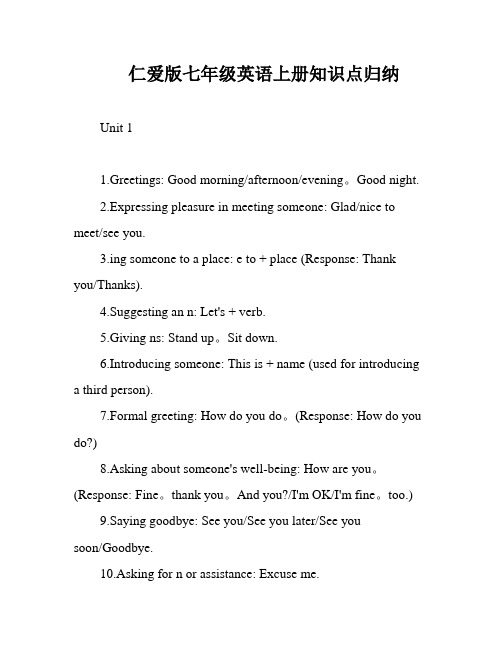
仁爱版七年级英语上册知识点归纳Unit 11.Greetings: Good morning/afternoon/evening。
Good night.2.Expressing pleasure in meeting someone: Glad/nice to meet/see you.3.ing someone to a place: e to + place (Response: Thank you/Thanks).4.Suggesting an n: Let's + verb.5.Giving ns: Stand up。
Sit down.6.Introducing someone: This is + name (used for introducinga third person).7.Formal greeting: How do you do。
(Response: How do you do?)8.Asking about someone's well-being: How are you。
(Response: Fine。
thank you。
And you?/I'm OK/I'm fine。
too.)9.Saying goodbye: See you/See you later/See yousoon/Goodbye.10.Asking for n or assistance: Excuse me.11.Introducing oneself: I'm + name.12.Origin: Be from/Come from.nguage: In English.14.Spelling: Can you spell it。
(Response: Yes/No).15.Responding to thanks: That's OK/That's all right/You'ree/Not at all.16.Age:。
仁爱英语七年级上册知识点归纳完整版

仁爱英语七年级上册知识点归纳完整版一、短语:come from 出生(于);来自in English 用英语(表达)look like 看起来像give sth. to sb. 把(某物)给(某人) look at 看着help sb. with sth. 帮助(某人)做(某事) a little 一点点each other 互相a lot 非常,更加,很very much 非常,更加,很have a seat 坐下,就座look after 照顾,照看next time 下一次try on 试穿good idea 好主意such as 比如,例如wait a moment 稍候,等一会儿family tree 家谱look the same 看起来一样have a picnic 去野餐go fishing 去钓鱼go shopping 去购物do some shopping 购物take one's order 记下顾客点的菜fly a kite 放风筝different looks 不同的相貌have breakfast 吃早餐have lunch 吃午饭have supper 吃晚饭have dinner 吃饭all right 好的on one's way home 在某人回家的路上find one's way home 找到回家的路 a glass of 一玻璃杯a bottle of 一瓶 a pair of 一双have fun 玩得开心think of 认为speak to sb. 对某人说call sb. back 回拨电话给某人get up 起床eat out 下馆子,出去吃饭go home 回家go to school 去上学help oneself to sth. 随便吃(喝)些什么be free 有空have no time 没时间over there 在那儿think about 考虑on a farm 在农场help sb. with sth. 帮助某人某事at night 在夜晚on Sunday 在星期天go out 出去go for a picnic 去野餐on Sunday morning 在星期天早晨at six o'clock 在六点钟be from 出生(于);来自go to the zoo 去动物园Welcome to China! 欢迎到中国来!Don't worry! 别担忧!in the same grade 在同一个年级in different classes 在不同的班级telephone number 电话号码junior high school 初中You're welcome! 别客气!Thank you! 谢谢你!Can I help you? 我能帮你什么忙吗?Here you are! 给你!Here it is! 它在这Here we are! 我们到了!be afraid 恐怕,害怕in different clothes 不同的衣服be in blue 蓝色衣服be in a red T-shirt 红色T恤be in black pants 黑色裤子help sb. do sth. 助某人做某事want to do sth. 要做某事like to do sth. 欢做某事would like to do sth. 要做某事Are you kidding? 是开玩笑吧?Thank you all the same! 是要谢谢你!a bag of一袋That's right!没错!That's all right!不用谢!没关系!how many多少how much多少too heavy太重this Sunday这个星期日forget to do sth.忘记去做某事See you later!再见!what's up?怎么啦?What's wrong with you?你怎么啦?have to不得不carry water提水sing a song唱歌be in在家be out在外面ask sb. to do sth.要求某人做某事want sb. to do sth.想要某人去做某事would like sb. to do sth.想要某人去做某事at my home在我家What time is it?几点了?half past seven七点半 a quarter to eight差一刻八点It's time to do sth.该做某事的时候了。
仁爱英语七年级上知识点
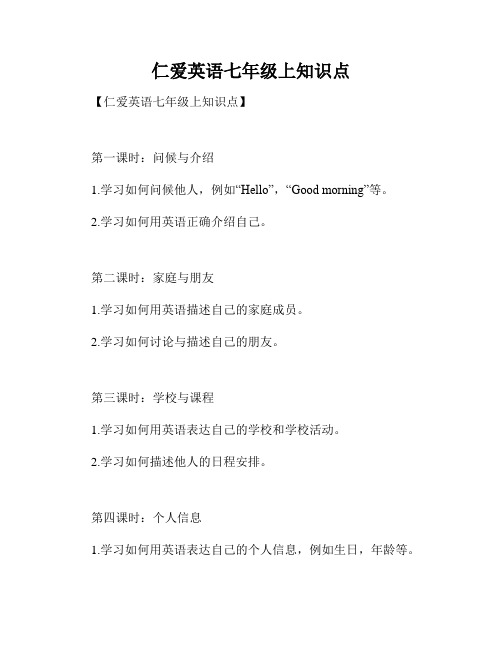
仁爱英语七年级上知识点【仁爱英语七年级上知识点】第一课时:问候与介绍1.学习如何问候他人,例如“Hello”,“Good morning”等。
2.学习如何用英语正确介绍自己。
第二课时:家庭与朋友1.学习如何用英语描述自己的家庭成员。
2.学习如何讨论与描述自己的朋友。
第三课时:学校与课程1.学习如何用英语表达自己的学校和学校活动。
2.学习如何描述他人的日程安排。
第四课时:个人信息1.学习如何用英语表达自己的个人信息,例如生日,年龄等。
2.学习如何讨论并描述他人的个人信息。
第五课时:购物与饮食1.学习如何用英语购买物品,例如面包,牛奶等。
2.学习如何用英语点餐并描述自己喜欢的食物。
第六课时:活动与爱好1.学习如何用英语描述自己的爱好以及自己参与的活动。
2.学习如何讨论他人的爱好以及他们参加的活动。
第七课时:时间与日期1.学习如何用英语表达时间和日期。
2.学习如何预定约会并记录重要日期,例如约会,生日等。
第八课时:天气与季节1.学习如何用英语表达天气和季节。
2.学习如何描述他人的天气和季节体验。
第九课时:交通工具1.学习如何用英语描述常见的交通工具,例如自行车,汽车以及公共交通工具。
2.学习在英语中请求帮助和指示方向。
第十课时:健康与生活方式1.学习如何用英语描述健康和生活方式,例如进行体育锻炼,不吃垃圾食品等。
2.学习如何讨论他人的健康状况和生活方式。
以上就是仁爱英语七年级上的主要知识点,掌握这些知识点将使你更自信地用英语与他人交流。
希望你能够认真学习并用英语学习更多的知识点。
仁爱版七年级英语上册知识汇总(最新版)
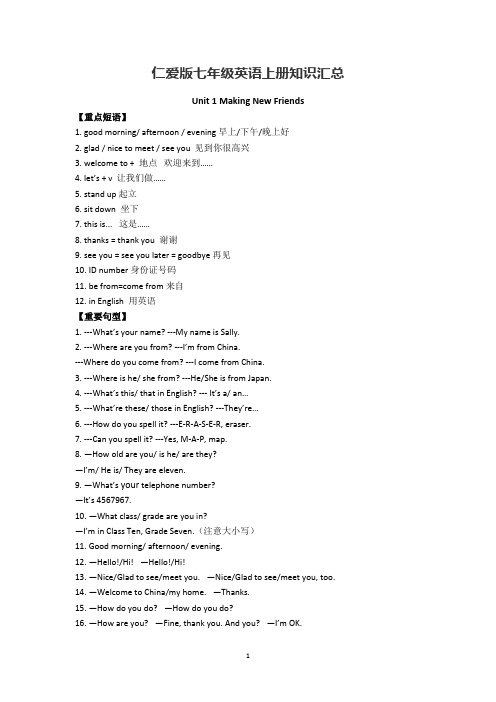
仁爱版七年级英语上册知识汇总Unit 1 Making New Friends【重点短语】1. good morning/ afternoon / evening 早上/下午/晚上好2. glad / nice to meet / see you 见到你很高兴3. welcome to + 地点欢迎来到……4. let’s + v让我们做……5. stand up 起立6. sit down 坐下7. this is... 这是……8. thanks = thank you 谢谢9. see you = see you later = goodbye 再见10. ID number 身份证号码11. be from=come from 来自12. in English 用英语【重要句型】1. ---What’s your name? ---My name is Sally.2. ---Where are you from? ---I’m from China.---Where do you come from? ---I come from China.3. ---Where is he/ she from? ---He/She is from Japan.4. ---What’s this/ that in English? --- It’s a/ an…5. ---What’re these/ those in English? ---They’re…6. ---How do you spell it? ---E-R-A-S-E-R, eraser.7. ---Can you spell it? ---Yes, M-A-P, map.8. —How old are you/ is he/ are they?—I’m/ He is/ They are eleven.9. —What’s your telephone number?—It’s 4567967.10. —What class/ grade are you in?—I’m in Class Ten, Grade Seven.(注意大小写)11. Good morning/ afternoon/ evening.12. —Hello!/Hi! —Hello!/Hi!13. —Nice/Glad to see/meet you. —Nice/Glad to see/meet you, too.14. —Welcome to China/my home. —Thanks.15. —How do you do? —How do you do?16. —How are you? —Fine, thank you. And you? —I’m OK.17. —See you then/ later. —See you.18. —Goodbye. —Bye.19. —Thank you. —You’re welcome./That’s OK./Not at all.【重点语法】1. 元音字母:Aa Ee Ii Oo Uu包含有以下元音的字母:[e] Aa Hh Jj Kk[i:] Ee Bb Cc Dd Gg Pp Tt Vv[aɪ] Ii Yy[ju:] Uu Qq Ww[e] Ff Ll Mm Nn Ss Xx Zz2. 大小写句首字母,人名,地名,称呼语,专有名词,星期的首字母要大写,引人注意。
仁爱版七年级上册英语全册知识点总结

考点一 thank的用法 【课文原句】 Thank you. 谢谢你。(七上P1) thank常用在日常交际中,表示对对方的感激之情。其常用 句型为thank sb. for (doing) sth.“因(做)某事而感谢某人”, 相当于“thanks for (doing) sth.”。
单项选择 4.(2019·预测)—Hello, this is Tina speaking. Is that Sam? —Sorry, he isn't here at this moment. _A__? A.Can I take a message B.What are you saying to Tina C.May I speak to Sam D.What's that speaking
【拓展】
词汇 helpful helpless
含义
用法
有帮助的;有用的
be helpful to...“对……有用 ”
feel helpless“感到无能为力 无助的;无法抑制的
”
用适当的介词填空 13.Bill has made great progress _w__it_h_ the help of his teacher.
单项选择
7.(2018·安徽中考)—Will you go to the picnic this Saturday?
—I'd like to, _A__ I'll have to help look after my baby sister.
A.but
B.or
C.and
D.so
8.(2018·湖北襄阳中考)—Be quick, _C__ we'll fail to catch
仁爱英语七年级上册知识点归纳完整版
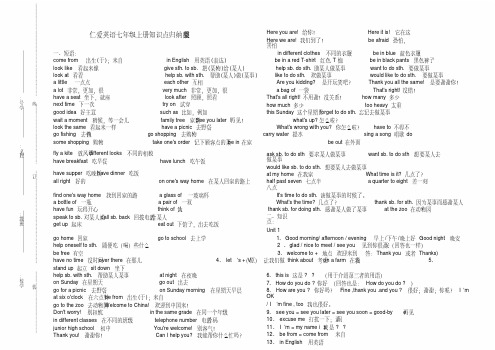
仁爱英语七年级上册知识点归纳完整版Here you are! 给你!Here it is! 它在这Here we are! 我们到了!be afraid 恐怕,害怕一、短语:in different clothes 不同的衣服be in blue 蓝色衣服come from 出生(于);来自in English 用英语(表达) be in a red T-shirt 红色 T 恤be in black pants 黑色裤子look like 看起来像give sth. to sb. 把(某物)给(某人) help sb. do sth.助某人做某事want to do sth. 要做某事look at 看着help sb. with sth. 帮助(某人)做(某事) like to do sth. 欢做某事would like to do sth. 要做某事a little 一点点each other 互相Are you kidding? 是开玩笑吧?Thank you all the same! 是要谢谢你!a lot 非常,更加,很very much 非常,更加,很 a bag of一袋That's right!没错!:号学线have a seat坐下,就座look after 照顾,照看next time 下一次try on 试穿good idea 好主意such as 比如,例如That's all right!不用谢!没关系!how many多少how much多少too heavy太重this Sunday这个星期日forget to do sth.忘记去做某事wait a moment 稍候,等一会儿family tree 家谱S ee you later再!见!what's up?怎么啦?look the same 看起来一样have a picnic 去野餐What's wrong with you?你怎么啦?have to不得不go fishing 去钓鱼go shopping 去购物carry water提水sing a song唱歌 do some shopping购物take one's order记下顾客点的菜be in 在家be out在外面:名姓fly a kite 放风筝different looks 不同的相貌have breakfast吃早餐have lunch 吃午饭ask sb. to do sth要. 求某人做某事want sb. to do sth想.要某人去做某事would like sb. to do sth.想要某人去做某事订have supper吃晚饭have dinner 吃饭all right 好的on one's way home 在某人回家的路上at my home在我家What time is it?几点了?half past seven七点半 a quarter to eight差一刻八点find one's way home 找到回家的路 a glass of 一玻璃杯It's time to do sth.该做某事的时候了。
仁爱英语七年级上册知识点归纳
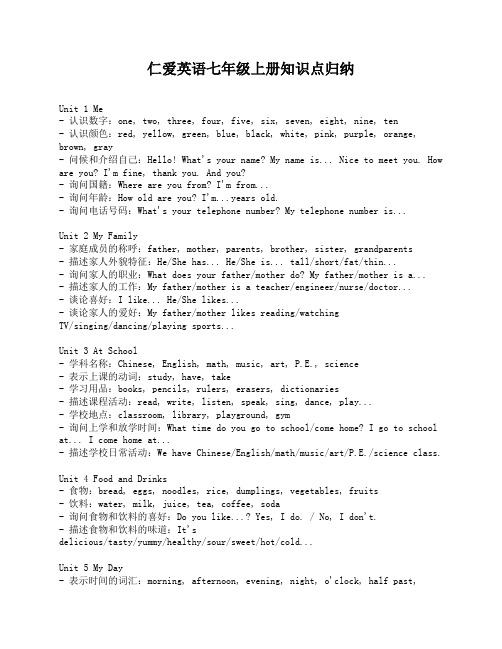
仁爱英语七年级上册知识点归纳Unit 1 Me- 认识数字:one, two, three, four, five, six, seven, eight, nine, ten- 认识颜色:red, yellow, green, blue, black, white, pink, purple, orange, brown, gray- 问候和介绍自己:Hello! What's your name? My name is... Nice to meet you. How are you? I'm fine, thank you. And you?- 询问国籍:Where are you from? I'm from...- 询问年龄:How old are you? I'm...years old.- 询问电话号码:What's your telephone number? My telephone number is...Unit 2 My Family- 家庭成员的称呼:father, mother, parents, brother, sister, grandparents- 描述家人外貌特征:He/She has... He/She is... tall/short/fat/thin...- 询问家人的职业:What does your father/mother do? My father/mother is a...- 描述家人的工作:My father/mother is a teacher/engineer/nurse/doctor...- 谈论喜好:I like... He/She likes...- 谈论家人的爱好:My father/mother likes reading/watchingTV/singing/dancing/playing sports...Unit 3 At School- 学科名称:Chinese, English, math, music, art, P.E., science- 表示上课的动词:study, have, take- 学习用品:books, pencils, rulers, erasers, dictionaries- 描述课程活动:read, write, listen, speak, sing, dance, play...- 学校地点:classroom, library, playground, gym- 询问上学和放学时间:What time do you go to school/come home? I go to school at... I come home at...- 描述学校日常活动:We have Chinese/English/math/music/art/P.E./science class.Unit 4 Food and Drinks- 食物:bread, eggs, noodles, rice, dumplings, vegetables, fruits- 饮料:water, milk, juice, tea, coffee, soda- 询问食物和饮料的喜好:Do you like...? Yes, I do. / No, I don't.- 描述食物和饮料的味道:It'sdelicious/tasty/yummy/healthy/sour/sweet/hot/cold...Unit 5 My Day- 表示时间的词汇:morning, afternoon, evening, night, o'clock, half past,quarter past, quarter to- 描述一天的安排:I get up at... I go to school at... I have lunch at (I)come home at... I do my homework at... I go to bed at...- 谈论每天做的事情:I usually... I sometimes... I often... I always... on weekdays/on weekends.- 描述一周的安排:Monday, Tuesday, Wednesday, Thursday, Friday, Saturday, Sunday. On Monday, I have Chinese/English/math/music/art/P.E./science class.Unit 6 In the Classroom- 描述教室物品:desk, chair, blackboard, bookcase, door, window, computer, clock- 表示教室位置:in front of, behind, next to, on, under, in, between- 询问教室物品的位置:Where is the...? It's... In/on/under/next to/between... - 描述教室活动:sit, stand, open, close, read, write, listen, speak, draw, sing, dance, play...- 询问和回答问题:What's this? It's a/an... What are these? They're...- 数词:first, second, third, fourth, fifth, sixth, seventh, eighth, ninth, tenthUnit 7 Sports and Hobbies- 描述体育运动:play basketball/football/tennis/volleyball/baseball/table tennis/badminton/swimming...- 描述爱好:My hobby is... I like... I enjoy...- 提问对方的爱好:What's your hobby? Do you like...? Yes, I do. / No, I don't. - 数词:every day, once a week, twice a month, three times a year- 谈论周末的活动:On weekends, I often... I sometimes... I never...以上是仁爱英语七年级上册的知识点归纳,希望对您有所帮助。
仁爱版七年级上册语法知识点总结

仁爱版七年级上册语法知识点总结一、一般现在时。
1. 概念。
- 表示经常发生的动作或存在的状态。
例如:I often get up at six o'clock.(我经常在六点起床。
)- 表示客观事实或普遍真理。
例如:The earth goes around the sun.(地球绕着太阳转。
)2. 句子结构。
- 肯定句:- 主语 + be动词(am/is/are)+ 其他。
例如:He is a student.(他是一名学生。
)- 主语(非第三人称单数)+ 动词原形+ 其他。
例如:They play football every day.(他们每天踢足球。
)- 主语(第三人称单数)+ 动词第三人称单数形式+ 其他。
例如:She likes reading books.(她喜欢读书。
)- 否定句:- 主语 + be动词(am/is/are)+ not+ 其他。
例如:I am not a teacher.(我不是一名教师。
)- 主语(非第三人称单数)+ don't+ 动词原形+ 其他。
例如:They don't like apples.(他们不喜欢苹果。
)- 主语(第三人称单数)+ doesn't+ 动词原形+ 其他。
例如:He doesn't go to school on Sunday.(他星期天不去上学。
)- 一般疑问句:- Be动词(am/is/are)+ 主语 + 其他?例如:Are you a doctor?(你是一名医生吗?)- (非第三人称单数)Do+ 主语+ 动词原形+ 其他?例如:Do they play basketball?(他们打篮球吗?)- (第三人称单数)Does+ 主语+ 动词原形+ 其他?例如:Does she have a pen?(她有一支笔吗?)二、名词的单复数。
1. 规则变化。
- 一般情况加 -s。
例如:book - books,pen - pens。
仁爱英语七年级上册知识点归纳完整版
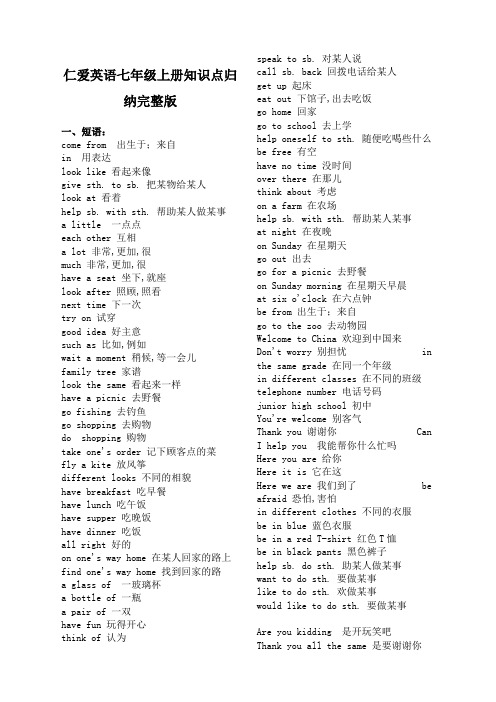
仁爱英语七年级上册知识点归纳完整版一、短语:come from 出生于;来自in 用表达look like 看起来像give sth. to sb. 把某物给某人look at 看着help sb. with sth. 帮助某人做某事a little 一点点each other 互相a lot 非常,更加,很much 非常,更加,很have a seat 坐下,就座look after 照顾,照看next time 下一次try on 试穿good idea 好主意such as 比如,例如wait a moment 稍候,等一会儿family tree 家谱look the same 看起来一样have a picnic 去野餐go fishing 去钓鱼go shopping 去购物do shopping 购物take one's order 记下顾客点的菜fly a kite 放风筝different looks 不同的相貌have breakfast 吃早餐have lunch 吃午饭have supper 吃晚饭have dinner 吃饭all right 好的on one's way home 在某人回家的路上find one's way home 找到回家的路a glass of 一玻璃杯a bottle of 一瓶a pair of 一双have fun 玩得开心think of 认为speak to sb. 对某人说call sb. back 回拨电话给某人get up 起床eat out 下馆子,出去吃饭go home 回家go to school 去上学help oneself to sth. 随便吃喝些什么be free 有空have no time 没时间over there 在那儿think about 考虑on a farm 在农场help sb. with sth. 帮助某人某事at night 在夜晚on Sunday 在星期天go out 出去go for a picnic 去野餐on Sunday morning 在星期天早晨at six o'clock 在六点钟be from 出生于;来自go to the zoo 去动物园Welcome to China 欢迎到中国来Don't worry 别担忧 in the same grade 在同一个年级in different classes 在不同的班级telephone number 电话号码junior high school 初中You're welcome 别客气Thank you 谢谢你 Can I help you 我能帮你什么忙吗Here you are 给你Here it is 它在这Here we are 我们到了 be afraid 恐怕,害怕in different clothes 不同的衣服be in blue 蓝色衣服be in a red T-shirt 红色T恤be in black pants 黑色裤子help sb. do sth. 助某人做某事want to do sth. 要做某事like to do sth. 欢做某事would like to do sth. 要做某事Are you kidding 是开玩笑吧Thank you all the same 是要谢谢你a bag of一袋That's right没错That's all right不用谢没关系 how many多少how much多少 too heavy太重this Sunday这个星期日forget to do sth.忘记去做某事See you later再见 's up怎么啦's wrong with you你怎么啦 have to 不得不carry water提水sing a song唱歌be in在家be out在外面ask sb. to do sth.要求某人做某事want sb. to do sth.想要某人去做某事would like sb. to do sth.想要某人去做某事at my home在我家What time is it几点了half past seven七点半a quarter to eight差一刻八点It's time to do sth.该做某事的时候了; What's the time几点了thank sb. for sth.因为某事而感谢某人thank sb. for doing sth.感谢某人做了某事 at the zoo在动物园二、知识点:Unit 11、Good morning/ afternoon / evening 早上/下午/晚上好 Good night 晚安2 、glad / nice to meet / see you 见到你很高兴回答也一样3、welcome to + 地点欢迎来到答:Thank you 或者 Thanks4、let’s + V原让我们做5、 stand up 起立 sit down 坐下6、this is 这是…… 用于介绍第三者的用语7、How do you do 你好回答也是:How do you do 8、 How are you 你好吗 Fine ,thank you .and you 很好;谢谢;你呢I’m OK / I’m fine , too . 我也很好;9、 see you = see you later = see you soon = good-bye 再见10、 excuse me 打扰一下;请问11、I’m = my name is 我是……12、 be from = come from 来自13、 in English 用英语14、 Can you spell it Yes / No 你能拼写它吗能/不能15、That’s OK / That’s all right / You’re welcome / Not at all 不用谢16、…… years old ……岁17、 telephone number 电话号码number 号码 ID number 身份证18、 the same 相同的反义词是different 不同的例: We are in the same grade, but we are in different classes. 句型:19、What is your name 你的名字是什么20、Where +be + 主语 + from 某人来自于哪里回答:主语+be+地点例: Where are you fromI am from quanzhou.21、How old + be + 主语某人几岁回答:主语 + be + 数字例:How old are you I’m forteen.22、What is your telephone number 你的电话号码是多少回答:My telephone number is或者It’s 注意:读出号码的时候要逐个读出;23、What class / grade +be + 主语 + in 某人在哪一个班级/年级例:what class are you in I am in Class Five. 注意:Class 和 Five 需要大写what grade are you in I am in Grade Seven. 注意: Glass 和 Seven 需要大写 24、What’s this/ that in English 这是什么回答:It’s a/an + 单数名词. 这是…… What’ re these/ those in English 这些是什么回答:They’re + 复数名词这些是……25、How do you spell it 你怎么拼写它 E-R-A-S-E-R, eraser. 注意拼读方法Unit 2 1、 sb + has/ have an /a + adj + 五官 === sb’s 五官 is / are + adj 描述长相例:Lily has a small nose. = Lily’s nose is small. 2、 I know = I see 我明白了 3、That’s right 那是对的 4、look the same look like 看起来相像look different 看起来不同例: Jim and Lilei look the same.== Jim looks like Lilei. . 5、 look at + n 看某物 look for +n 寻找某人/某物 look after +n 照顾某人 6、 both 两者都…… all 三者或者三者以上都Both 和all 位于 be 动词或情态动词后,位于行为动词前;例: We are both students. We both have black eyes. We can both speak English. 注意: 7、 give sth to sb = give sb sth 把某物给某人;注意:如果 sth 是 it 或 them,只能用前者注意 ,只能用前者8、 have different looks == look different 有着不同的长相看起来不相像have the same look. ==look the same 有着相同的长相看起来很相像 9、over there 在那边 come in 请进 go out 出去 10、 in + 颜色或 in a/an/the +颜色 + 衣服表示穿着……颜色的衣服常常接在名词的后面,表示穿颜色衣服的…… 如 the girl in red is my sister.11、 too + adj 太……12、 pants 和shoes 做主语,谓语动词用复数;但 a pair of pants/ shoes 作主语时,谓语动词用单数形式例: His shoes are black. A pair of shoes is under the bed. 13、 in the morning/ afternoom/ evening 在早上/下午/晚上 at night 在晚上 14、 go shopping = go to the shop 去购物类似的有 go swimming go fishing go skating 等等帮助某人做某事注意:sb 用代词时必须用宾格 15、 help sb. to do sth == help sb with sth 16、 high school 中学 17、 play +球类 play the 乐器 18、 think of 认为,想 think about 考虑 I think + 从句我认为……例: I think he you are right.否定式常否定主句,但翻译时要否定后面的从句例:I don’t think he can come. 我认为他不会来了.不能说:我不认为他会来19、What do/does + 主语 + look like 询问人的长相例: What does your English teacher look like 20、What’s and ……加……是什么回答:It’s例:What’s red and yellow It’s orange. What’s two and five It’s seven. 21、Whose + 东西 + is this/ that Whose + 东西 +are these/ those 这/这些是谁的……例:Whose coat is this It is mine. Whose shoes are these They are hers.22、Who is the letter from 这封信来自于谁It’s f rom Lily. 它来自于莉莉;23、What color be + 东西回答:It’s +颜色或者They’er + 颜色例:What color is your dress It’s black.Unit 31、Could you please…… 后接动词原形你愿意做某事吗我能做某事吗 MayI …… 后接动词原形2、 the English corner 英语角3、 live in + 地点住在某地 live with + 人和某人住在一起4、 What does he say in the letter 他在信里说了些什么 What does he say on the phone 在电话里说了些什么5、 a lot = very much 放在句末,修饰动词,非常……not at all 一点也不……例: I like the boy a lot/ very much.I don’t like the boy at all.. 6、 each other 相互,彼此例: S tudents often talk to each other in class. 7、 do sth with sb 和某人一起做某事 8、 No problem 没问题9、 speak + 语言说某种语言 speak English speak Chinese 10、 the Great Wall 长城 11、 come/go to + 地点去某地但 home 、 here 、 there 这些是副词,前面不能加 to例:go home / come here / go there go to do sth 去做某事例: They go to play basketball. 12、 like doing sth 喜欢做某事 like to do sth 想要做某事 13、It’s + adj +to sb 对某人来说是……的 14、 help sb with sth =help sb to do sth 帮助某人某事 15、 be at home = be in 在家 go home 回家 get home 到家in one’s home 在某人的家里 16、 have a seat / take a seat / sit down 请坐下 17、office worker 办公室职员 cook 厨师cooker 炊具 18、 on a farm 在农场上on the sofa 在沙发上 19、 a photo of one’s family 某人的全家照 Family Tree 家谱首字母都大写 20、 in a hospital 在医院纯属地点概念 in hospital 因病住院例:He is ill in hospital. 他生病住院 He is in a hospital.他在医院里不一定是因为生病来到医院 21、 look after sb = take care of sb 照顾某人22、 teach sb sth = teach sth to sb 教某人某东西 teach sb to do sth 教某人做某事23、help oneself to sth. 请随便吃…… help yourself/ yourselves to fish24、I’d like sth = I would like sth. 我想要……25、 Would like to do sth = want to do sth 想要做某事26、 Would you like something to eat drink 你想要一些吃喝的东西吗 to eat 或 to drink 修饰 something,作为后置定语; 27、 Here you are . 给你 Here we are. 我们到了28、What about …… == Howabout …… ……怎么样后接代词或名词,还可以接动名词即What about doing sth29、 all right 好的30、a cup of tea 一杯茶 two cups of tea 两杯茶31、 milk for me 我要牛奶32、Why not ……后接动词原形 = Why don’t you …… 后接动词原形为什么不做某事呢回答:Good idea 好主意;33、 May I take your order 可以点菜了吗34、 wait a moment = just a moment 等一下,请稍侯 wait for sb 等待某人35、 Can I help you = May I help you = What can I do for you 需点什么帮忙吗36、 eat out 出去吃饭37、 let sb do sth 让某人做某事38、 have dinner/ breakfast/lunch/supper 吃正/早/午/晚餐39、 a kind of 一种…… all kinds of 各种各样的……40、be friendly/kind to sb 对某人友好41、 such as 例如例:I like fruits, such as oranges,bananas and apples42、 be glad to do sth例: I am glad to meet you, I am glad to be here.. 句型:43、What do/does + 主语+ do == What +be+ 主语. == What’s one’s job 回答:主语 + be + 职业.例如: What does your father do = What is your father = What’s your father’s job He is a teacher.Unit 41、 try on 试穿……2、 we/I will take it 我们/我买下了这里的 take 相当于 buy3、 buy sth for sb = buy sb sth给某人买某物; 4、I’m just looking 我只是看看; 5、 three hundred and sixty-five 365 百位数和十位数之间加and , 十位数和个位数之间加”-“6、 a pair of 一对/一双……7、 running shoes 跑鞋8、 Are you kidding 你开玩笑吧;9、 think about 考虑;10、 thank you all the same 仍然谢谢你;11、 Is that all 就这么多吗That’s all. 就这么多吧 I12、 I think so. 我认为是这样的. I don’t think so.我认为不是这样的. 13、当把东西给某人时可以说: Here you are 或 Here be + 东西或 Here it is.14、Don’t worry.别担心① worry about + 宾语如:Do you worry about your leesson ②Worried 烦恼的 be worried about +宾语如:She is worried about her mother.15. a few +可数名词肯定一点,一些;;few + 可数名词:否定几乎没有 alittle +不可数名词肯定一点,一些;;little + + 不可数名词:否定几乎没有16、 be free = have time 有空的;反义词:be busy = have no time Are you free tomorrow == Do you have time tomorrow17、在某一天使用介词 on , 在某个时刻用 at 如:On Sunday at a half past six 当 this 接时间,不用介词, this Sunday18、What’s up = what’s wrong = What’s the matter 什么事19、 forget to do sth. 忘记去做某事事还没做 forget doing sth 忘记曾做过某事事已做完20、 tell sb about sth. 告诉某人某事tell sb sth = tell sth to sb 把某事告诉某人 ask/tell sb to do sth 叫某人做某事 ask/tell sb not to do sth 叫某人不要做某事21、电话用语:①Who’s this 你是哪位②Is this ……你是……吗③This is ……speaking 我是…… ④May I speak to……我可以找……吗 22、go for sth = go to do sth 去做某事如: go for class = go to have class.23、It’s fun 真是有趣的事24、 call sb = give sb a call 打电话给某人 call sb back 给某人回电话25、I’m afrai d /sorry that + 从句恐怕……/ 对不起,……26、I have no time = I don’t have any time 我没有时间 no = not any27、 be not in = be not at home = be out 出去了,不在家;28、 sing a song / sing some songs 唱歌; fly a kite 放风筝;draw picture 画画 play sports 做运动; watch TV 看电视 read books 看书 read newspaper 看报纸29、 let sb do sth 后接动词原形让某人做某事30、时间读法有顺读法和逆读法:顺读法eleven thirty-six 表示 11:36 逆读法分钟数小于等于 30 分用 past , 分钟数大于 30 分用 to,如 five past ten 表示 10:05; five to ten 表示 9:55,half past six 表示 6:30 , a querter to six 表示 5:4531、 show sth to sb = show sb sth 把……拿给某人看;作为名词表示演出,表演32、祈使句的否定句,直接在句首加上Don't 就可以了33、have to ……后接动词原形不得不……34.、It’s time for sth/ doing sth It’s time to do sth 该到做……的时候了It’s time for sb to do sth 是某人做某事的时候了35、 next time 下一次 next week 下个星期 the next day 第二天;36、next to…… = near…… 在……旁边37、 get up 起床 go to bed 上床睡觉;get sb up 叫某人起床38、do one’s homework 做作业;39、 have a picnic 野餐;have class 上课 have a meeting 开会 have a party 举办聚会 have dinner/ breakfast/lunch/supper 吃正/早/午/晚餐 have +东西吃/喝……have a good time =enjoy oneself 玩得很愉快 have sb to do sth 让某人做某事 have to do sth 不得不……40、on the weekday 在周末;41、lot of = lots of = many =much 许多的,大量的42、 in the sun 在阳光下;43、sb like best = sb’s favorite + 种类is / are …… 谁最喜欢…… 44、on one’s way to 在某人去……的路上;on one’s w ay home 在某人回家的路上45、 Here we are. 我们到了46、It’s very kind of you 你真是太好了;47、 thanks / thank you for + n /v-ing 为……而感谢你;48、 in the tree 在树上外物附着 on the tree 在树上树上本身长出的东西 In the wall 在墙里如 window on the wall 在墙上49、 What do you think of = How do you like 你认为……怎么样例:What do you think of your English teacher= How do you like your English teacher 50、 How much be + 主语回答:It’s / They’re + 价钱. How much is your English book 问价格还可以用what’s the price of …… 为什么不做某事呢 51、Why not ……后接动词原形= Why don’t you …… 后接动词原形回答:Good idea 好主意;52、 What time is it == What is the time 回答:It’s +时间考点归纳:1、英文中常用的问候语及其回答:-Hello. -Hello.—Hi. —Hi—Good morning. —Good morning.—Good afternoon. —Good afternoon. —Good evening. —Good evening. —Good night. —Good night.—How do you do —How do you do—How are you —Fine, thank you.注意:对“How do you do” 和“How are you” 两句话的回答不要弄混淆; 2、sorry “对不起” 用于引出某一过错; Excuse me. “对不起” 用于引起对方的注意;例如:I’m sorry I can’t speak English. Excuse me, is this your backpack3、be late for ... 做……迟到 be late for school/ class/ work/ the meeting 上学/上课/上班/开会迟到注意: late 的副词仍为 late, 不能写成 lately.例如:请不要晚到学校; Please don’t arrive lately for school. × Please don’t arrive late for school. √ 4、见到某人很高兴的几种表达:Nice to meet you. = Happy/ Glad/ Pleased to meet you.5、What’s this in English =What’s the English for this 这个用英语怎么说用什么语言,介词用in: “in + 语言”.例如: in English 用英语 in Chinese 用汉语 in Japanese 用日语注意:用钢笔:in ink = in pen = witha pen 让我们学英语;6、Let’s learn English. 让我们学英语;L et’s = let us 让我们Let’s do sth. = Why not do sth. = What/How about doing sth.如:Let’s learn English. = Why not learn English = What/How about learning English注意:let sb. do .. 中的 sb.即使是第三人称单数后面的动词仍用原形例如:Let her sing an English song.7、learn from 向……学习 learn to do sth. 学做……例如:Let us learn fromLei Feng. Lucy learns to play the guitar.8、对颜色提问的两种方法: Whatcolor … = What’s the color of … 例如: What color is your coat = What’s the color of your coatcolor 着色 color sth. + 颜色,例如: I want to color it red.color 是可数名词例如:I don’t like these colors.9、对姓名的几种提问及回答:What’s your name = May I have/know your nameMy name is … = I’m…10、call + sb. + at + … “给某人打电话”11、感谢你:Thanks. = Thank you. √ Thank. × Thanks you. × Thanks for + sth./doing sth. 为……而感谢你;例如:Thanks for your help. =Thanks for helping me.12、take, bring, carry 和 get 的区别:1take “带走”,从近处带到远处例如:Please take these books to your home after school.2 bring “带来”,从远处带来例如:Please bring me some cakes.3c arry “带”,无方向性,指移动较重、较大的东西,有“负重”的含义例如:The bag is too heavy for me. Can you carry it for me 4 get “去拿来”,相当于 go and bring例如:Can I get you something to drink 12、need 需要1 need + V原……” 例如:She need some cakes.2 need to do sth. “需要做……”例如:She needs to speak English often.13、There be 句型在某处有什么例如: There is a clock on the wall. There be 句型的就近原则:若有两个或两个以上的主语是,谓语常与靠近它的那个主语一致;例如:There is a book, two pens and some cups on the desk.There are two pens, some cups and a book on the desk.注意:There be与 have 的区别在于:have 表示某人或某物拥有什么;而There be 表示在什么地方存在什么; 14、want to do sth. “想要做……”例如:He wants to join the reading club.15、like v. 喜欢用法:like sth. / sb. 喜欢…like doing sth. 喜欢做…like to do sth. 想做…like sb. to do sth. 想要某人做…would like to do sth.想做… be like 像…look/sound like 看/听起来像…注意:like doing sth. 喜欢做…长期的喜好,习惯like to do sth. 想做…短期的,具体的某一次活动16、构词法:在动词后面加-er 或-or,将动词变为人的名词例如: sing-singer wait-waiter work-workerteach-teacher speak-speakervisit-visitor加-r: write-writer drive-driver双写尾字母: run-runnerswim-swimmer shop-shopper注意: cook烹调— cook 厨师-cooker 厨房用具17、a lot of = lots of 可以用来修饰可数名词和不可数名词;Jim drank a lot of/lots of beer. I have a lot of/lots of things to do. a lot 作状语,表示程度、数量或频率;例如:Thanks a lot. I know a lot about it.19、for 就……而言例如:I have some bread for supper.20、have/eat + 三餐“吃早/中/晚饭” 例如:I usually have lunch at home.21、对价格提问:How much …=What’s the price of …例如: How much is this sweater = What’s the price of this sweater 22、in + 颜色例如: She is in red. = She is in a red coat.\23、on, in, at 与时间状语连用: on + 具体某一天例如:I will do some shopping on Sunday.in + 时间段例如: in the morning / afternoon / eveningat + 几点例如:Our class is at 8:00注意:如果时间状语前面有这些词:this, that, next, tomorrow等, 则不用介词;例如: See you next time.24、对年龄的提问:How old are you What’s your age May I know/have your age 答:I’m ... years old. 注意:表达年龄的几个同义句: Tom is 15. =Tom is 15 years old. =Tom isa 15-year-old boy. =Tom is a boy of 15.25、think +句子例如:I think you are right.注意: think 的否定转移例如:I don’t think it is right.26、like ... best = favorite+…最喜欢…例如:Jack likes red best. =Jack’s favorite color is red.27、too/also/either的区别:too 用于句末例如: Tom is from America. Lucy is from America, too. also 用于句中be 动词后,行为动词前例如: Tom is from America. Lucy is also from America. either 用于否定句中例如:Tom isn’t from America. Lucy isn’t from America, either.28、speak/ say/ talk/ tell 的区别:speak+语言讲某种语言例如:She can speak Chinese. I can speak a little English. say 强调说话的内容例如:Let me say “Thanks” to you. talk 强调交谈:talk to/with ….和……交谈talk about … 谈论……tell 强调“告诉”:tell sb. sth. = tell sth. to sb.注意:say 还有“写着”的意思,例如:Look There is a card. It says “CLOSED”. 29、be good to 对…… 友好= be friendly/kind to…30、help oneself 随便吃……在使用时要注意反身代词的单复数;例如:Jim, help yourself, please. Help yourselves, boys. help sb. = give sb. a hand 帮助……help sb. with sth. 帮助某人做某事例如:Can you help kids with swimming 你能帮助孩子学游泳吗31、动词+介词构成的动词短语,其宾语是名词的时候,可放在动词与介词之间,也可以放在介词的后面例如: call sb. back = call back sb. 给……回电话 try sth on. = try on sth. 试穿……注意:如果宾语是代词 it 或 them 则只能放在中间例如:try it/them on.32、allof 全部,所有三者以上; bothand 两者都……放在助动词、情态动词、be 动词之后,行为动词之前例如:We are all students, we all work hard.My parents are both office workers.= Both my father and mother are office workers.All of the girls look nice.33、be from = come from…来自…… 注意:动词的变化: She’s from China. = She comes fromChina.She isn’t from England. = She doesn’t come from England.常见的错误: Where is he come from Where does he from国籍的几种表达方法: Tom 是个美国人;Tom is American. Tom is an American. Tom is an American boy. Tom is from America. Tom comes from America.售货员招呼顾客:① May I help you ② Can I help you③ What can I do for you ④ What would you like顾客常用语: ① No, thanks. I’m just looking . ② I’m looking for ... . ③ I’d like to have/buy ... . ④ Can you show me ...⑤ Could I have a look at ...询问顾客想买东西的特征: ① What kind would you like② What color would you like ③ What color would you like顾客询问价格: ① How much is itare they②What’s the pr ice of ...顾客决定要买:I’ll take/have itthem. 付钱: Here’s the money.。
仁爱版英语七年级上册知识点归纳
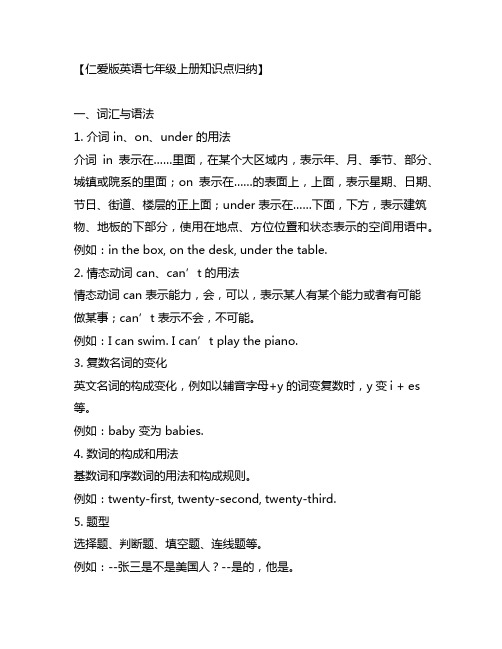
【仁爱版英语七年级上册知识点归纳】一、词汇与语法1. 介词 in、on、under 的用法介词in 表示在……里面,在某个大区域内,表示年、月、季节、部分、城镇或院系的里面;on 表示在……的表面上,上面,表示星期、日期、节日、街道、楼层的正上面;under 表示在……下面,下方,表示建筑物、地板的下部分,使用在地点、方位位置和状态表示的空间用语中。
例如:in the box, on the desk, under the table.2. 情态动词 can、can’t 的用法情态动词 can 表示能力,会,可以,表示某人有某个能力或者有可能做某事;can’t 表示不会,不可能。
例如:I can swim. I can’t play the piano.3. 复数名词的变化英文名词的构成变化,例如以辅音字母+y的词变复数时,y变i + es 等。
例如:baby 变为 babies.4. 数词的构成和用法基数词和序数词的用法和构成规则。
例如:twenty-first, twenty-second, twenty-third.5. 题型选择题、判断题、填空题、连线题等。
例如:--张三是不是美国人?--是的,他是。
二、阅读与表达1. 阅读准确度和理解能力能够根据所学知识,对文章、短文、图表等材料做准确、完整的理解和解读;能够运用所学的语言知识做出判断和解释。
例如:学习阅读文章,抓住信息点。
2. 表达和概括的能力学会用简洁的语言准确表达意思,总结概括文章中的重点信息。
例如:根据所学的语言知识,用简单易懂的语言总结文章内容。
3. 文章结构的认识和理解能够理解文章中的主体、开头、结尾;了解各种文章中表达的意思和结构。
例如:明白文章的开头、中间和结尾分别表达的意思及其结构。
三、写作与口语表达1. 完整的句子构成能力能够构成简单的句子,正确地使用句子成分和语序。
例如:主语+谓语+宾语的基本句型。
2. 简单句和复合句的使用能力能够灵活使用简单句和复合句表达自己的意思。
仁爱版英语七年级上册知识点总结

(三)缩写形式
I am = I'm
you are = you're
he is = he's she is = she's
it is =it's what's = what is where's= where is who's = who is that's = that is name's = name is
we are = we're you are = you're
they are = they're
isn't = is not aren't = are not
(四)特殊疑问句--对划线部分提问
1.where “在哪里” 问地点
Where are you from? I'm from China.
How is your mom?
She is fine.
How do you spell it?
M-A-P, map
6.how old “多少岁”问年龄
How old are you?
I'm 12 years old.
How old is Jane?
She is 11 years old.
(五)一般疑问句(be动词置句首,回答yes/no)
Where is she from? She is from Canada.
2.who “谁” 问人物 Who are they? They are Maria and Jane.
Who is he ? He is Kangkang.
3.what “什么“问事物 What's your/his/her name? My/His/Her name is Li Lei What's your/his/her telephone number? It is 6162632.
仁爱英语书七年级上册
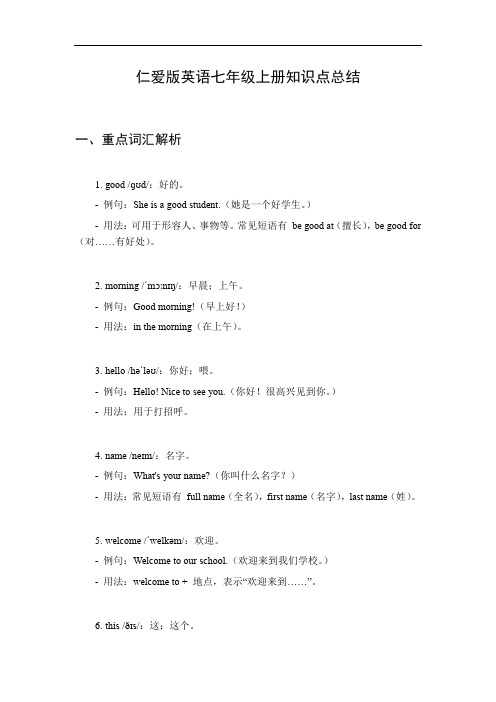
仁爱版英语七年级上册知识点总结一、重点词汇解析1.good /ɡʊd/:好的。
-例句:She is a good student.(她是一个好学生。
)-用法:可用于形容人、事物等。
常见短语有be good at(擅长),be good for (对……有好处)。
2.morning /ˈmɔːnɪŋ/:早晨;上午。
-例句:Good morning!(早上好!)-用法:in the morning(在上午)。
3.hello /həˈləʊ/:你好;喂。
-例句:Hello! Nice to see you.(你好!很高兴见到你。
)-用法:用于打招呼。
/neɪm/:名字。
-例句:What's your name?(你叫什么名字?)-用法:常见短语有full name(全名),first name(名字),last name(姓)。
5.welcome /ˈwelkəm/:欢迎。
-例句:Welcome to our school.(欢迎来到我们学校。
)-用法:welcome to + 地点,表示“欢迎来到……”。
6.this /ðɪs/:这;这个。
-例句:This is a book.(这是一本书。
)-用法:用于指近处的人或物。
7.that /ðæt/:那;那个。
-例句:That is a pen.(那是一支钢笔。
)-用法:用于指远处的人或物。
8.teacher /ˈtiːtʃə(r)/:教师。
-例句:She is a teacher.(她是一名教师。
)-用法:常见短语有English teacher(英语老师),math teacher(数学老师)等。
9.thank /θæŋk/:谢谢;感谢。
-例句:Thank you.(谢谢你。
)-用法:thanks = thank you,常见短语有thank sb. for sth.(因某事感谢某人)。
10.you /juː/:你;你们。
仁爱版七年级上册英语语法知识点总结
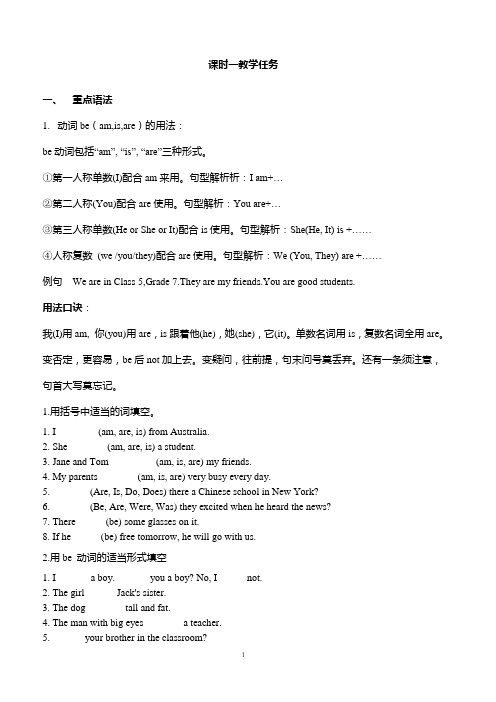
课时一教学任务一、重点语法1.动词be(am,is,are)的用法:be动词包括“am”, “is”, “are”三种形式。
①第一人称单数(I)配合am来用。
句型解析析:I am+…②第二人称(You)配合are使用。
句型解析:You are+…③第三人称单数(He or She or It)配合is使用。
句型解析:She(He, It) is +……④人称复数(we /you/they)配合are使用。
句型解析:We (You, They) are +……例句We are in Class 5,Grade 7.They are my friends.You are good students.用法口诀:我(I)用am, 你(you)用are,is跟着他(he),她(she),它(it)。
单数名词用is,复数名词全用are。
变否定,更容易,be后not加上去。
变疑问,往前提,句末问号莫丢弃。
还有一条须注意,句首大写莫忘记。
1.用括号中适当的词填空。
1. I ________(am, are, is) from Australia.2. She _______ (am, are, is) a student.3. Jane and Tom _________(am, is, are) my friends.4. My parents _______ (am, is, are) very busy every day.5. _______ (Are, Is, Do, Does) there a Chinese school in New York?6. _______ (Be, Are, Were, Was) they excited when he heard the news?7. There _____ (be) some glasses on it.8. If he _____ (be) free tomorrow, he will go with us.2.用be 动词的适当形式填空1. I ______ a boy. ______ you a boy? No, I _____ not.2. The girl______ Jack's sister.3. The dog _______ tall and fat.4. The man with big eyes _______ a teacher.5. ______ your brother in the classroom?6. Where _____ your mother? She ______ at home.7. How _______ your father?8. Mike and Liu Tao ______ at school.9. Whose dress ______ this?10. Whose socks ______ they?11. That ______ my red skirt.12. Who ______ I?13.The jeans ______ on the desk.14.Here ______ a scarf for you.15. Here ______ some sweaters for you.16. The black gloves ______ for Su Yang.17. This pair of gloves ______ for Yang Ling.18. The two cups of milk _____ for me.19. Some tea ______ in the glass.20. Gao shan's shirt _______ over there.第二课时(1)英语人称代词和物主代词一、人称代词表示“我”、“你”、“他”、“她”、“它”、“我们”、“你们”、“他们”的词,叫做人称代词。
新版仁爱英语七年级上册知识点归纳
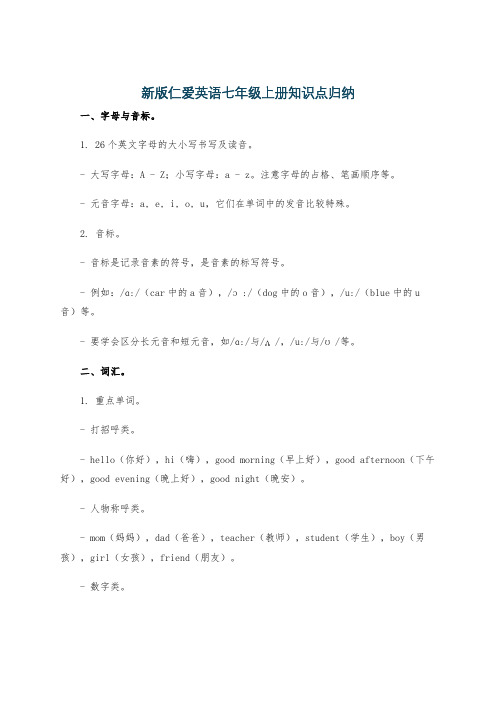
新版仁爱英语七年级上册知识点归纳一、字母与音标。
1. 26个英文字母的大小写书写及读音。
- 大写字母:A - Z;小写字母:a - z。
注意字母的占格、笔画顺序等。
- 元音字母:a, e, i, o, u,它们在单词中的发音比较特殊。
2. 音标。
- 音标是记录音素的符号,是音素的标写符号。
- 例如:/ɑ:/(car中的a音),/ɔ:/(dog中的o音),/u:/(blue中的u 音)等。
- 要学会区分长元音和短元音,如/ɑ:/与/ʌ/,/u:/与/ʊ/等。
二、词汇。
1. 重点单词。
- 打招呼类。
- hello(你好),hi(嗨),good morning(早上好),good afternoon(下午好),good evening(晚上好),good night(晚安)。
- 人物称呼类。
- mom(妈妈),dad(爸爸),teacher(教师),student(学生),boy(男孩),girl(女孩),friend(朋友)。
- 数字类。
- one,two,three,four,five,six(6),seven(7),eight(8),nine (9),ten(10)。
- 颜色类。
- red(红色),blue(蓝色),green(绿色),yellow(黄色),black(黑色),white(白色)。
- 文具类。
- pen(钢笔),pencil(铅笔),ruler(尺子),eraser(橡皮擦),book (书),notebook(笔记本)。
2. 单词的复数形式。
- 一般情况加 -s,如book - books,pen - pens。
- 以s, x, ch, sh结尾的加 -es,如box - boxes,bus - buses。
- 以辅音字母+y结尾的,变y为i加 -es,如baby - babies。
- 不规则复数形式,如man - men,woman - women,child - children。
仁爱英语七年级(上册)知识点归纳

..仁爱英语七年级上册知识点归纳Unit1一.常用表达法1.Good morning/afternoon/ evening早上/下午/晚上好Good night晚安(晚上告别)2.Glad/ nice to meet / see you见到你很高兴(回答也一样)例:-Nice to meet you.-Nice to meet you,too.3.Welcome to +地点欢迎来到⋯⋯(回答:Thank you或者Thanks)注意:如果地点是here或者there就不能用to.4.This is......这是⋯⋯(用于介绍第三者的用语)5.How do you do ?你好(回答也是:How do you do ?)6.Stand up起立Sit down坐下7.-How are you ?你好吗?-Fine\Notbad\Verywell,thank you .and you?很好;谢谢;你呢?-I’m OK / I’m fine, too .我也很好。
8.See you = Bye = Goodbye再见9.-Hereyouare.给你。
-Thankyou.谢谢。
10.excuse me.打扰一下;请问Excuse me,are youJane?11.I’m-----=my name is ----我是......She’s⋯=Her name is⋯她是......He’s⋯⋯=His name is⋯他是......例:-My name is Michael./I’m Michael.12.be from=come from来自●用be from时要注意与前面人称搭配,用不同的be动词He/She/It is from China.They/We/You are from China.I’m from China.●用come from时,要注意与第三人称进行搭配时用comes。
He/She/It comes from Canada.13.fullname全名familyname\lastname姓givenname\firstname名14.telephone number电话号码QQnumber QQ号码ID number身份证15.-Thankyouverymuch.\Thanksalot.\Manythanks.非常感谢你。
- 1、下载文档前请自行甄别文档内容的完整性,平台不提供额外的编辑、内容补充、找答案等附加服务。
- 2、"仅部分预览"的文档,不可在线预览部分如存在完整性等问题,可反馈申请退款(可完整预览的文档不适用该条件!)。
- 3、如文档侵犯您的权益,请联系客服反馈,我们会尽快为您处理(人工客服工作时间:9:00-18:30)。
仁爱英语七年级上册知识点归纳Unit 1 Making New Friends一、元音字母:Aa Ee Ii Oo Uu包含有以下元音的字母:[e] Aa Hh Jj Kk [i:] Ee Bb Cc Dd Gg Pp Tt Vv [aɪ] Ii Yy[ju:] Uu Qq Ww [e] Ff Ll Mm Nn Ss Xx Zz二、大小写句首字母,人名,地名,称呼语,专有名词,星期的首字母要大写,引人注意。
•Look!Is that Jane•He comes from Hubei, China.•。
•Mr. Wang, this is my mom.•What class are you in—I’m in Class Ten, Grade Seven.•On Sunday, we go to the West Hill for a picnic.三、问候语1. Good morning/ afternoon/ evening.2. Hello!/ Hi! ---Hello!/ Hi!3. Nice/ Glad to see/ meet you. ---Nice/ Glad to see/ meet you, too.4. Welcome to China/ my home. ---Thanks.5. How do you do ---How do you do&6. How are you ---Fine, thank you. And you ---I’m OK.7. See you then/ later. ---See you.8. Goodbye. ---Bye.9. Thank you. ---You’re welcome./ That’s OK./ Not at all.四、数字句型1. How old are you/ is he/ are they ---I’m/ He is/ They are eleven.2. What’s your telephone number ---It’s 4567967.3. What class/ grade are you in --- I’m in Class Ten, Grade Seven.(注意大小写)五、重要句型及短语1. What’s your name ---My name is Sally.-2. Where are you from ---I’m from China.Where do you come from ---I come from China.3. Where is he/ she from ---He/She is from Japan.4. What’s this/ that in English --- It’s a/ an……5. What’re these/ those in English ---They’re……6. How do you spell it ---E-R-A-S-E-R, eraser.7. Can you spell it ---Yes, M-A-P, map.六、Be动词的用法•我用am,你用are,is用于他、她、它,单数用is,复数就用are。
•含be动词的陈述句变否定句在be后加not,变一般疑问句将be提前。
•&•一般疑问句的肯定回答:Yes,人称代词+ be;否定回答:No, 人称代词+be + not。
如:They are teachers.----They are not teachers.----Are they teachers----Yes, they are./ No, they aren’t.七、(1)不定冠词a, an的用法:a /an 都表示“一,一个”,a 用在以辅音音素开头的单词前,如:a book; a desk; an 用在以元音音素开头的单词前,如:an apple / an orange/ an English book;/ an English boy/ an old man;/an actor/ an English teacher/ an office worker.(2)the是定冠词,表特指,单复数前面都可用•We are in the same class.•The girl in a pink skirt is Jane.•—•Where is the book•This isn’t my bike. The blue one is mine.(3) and 的用法•数字相加看做单数:Two and three is five.•颜色相加也是单数: Black and white is gray.•人和事物相加是复数:Lucy and Lily are sisters. The pen and the eraser are Jane’s八、名词单复数1. 名词变复数规则(1)规则变化1)一般在名词词尾加--s,如:car----cars; photo---photos; toy---toys; boy---boys【2)以s, x, ch, sh结尾的词,在词尾加---es,如:box---boxes; bus---buses3)以辅音字母+y结尾,变y为i再加es,如:baby---babies; family---families4)以fe结尾,变fe为v再加es,如:knife--- knives(2)不规则变化:如:foot---feet; man---men; woman---women; snowman---snowmen;2. 集体名词:people, clothes, police, family3. 成双出现的名词:shoes, pants(trousers), gloves, eyes, ears一词多义:An orange is orange.Unit 2 Looking Different一、重点句型1.!2.Who is your favorite actor3.We are in the same school, but we are in different grades.4.What do/does +主语+look like ……长得怎么样What does he look like --- He is not very tall but very strong.---She is tall and has short brown hair.5.We don’t look the same, but we are good friends.We look the same, but we are in different clothes.6.What color is/are +主语---It’s/ They’re +颜色.What color is her hair --- It’s blond.7.This is my cap. = This cap is mine.`Is this your cap = Is this cap yoursWhose cap is this = Whose is this cap --- It’s Sally’s.Whose are these bananas --- They’re their bananas/ theirs.8.His pants are blue and mine are white.(mine=my pants)My T-shirt is green and his is brown.(his=his T-shirt)9.I have small eyes, but he has big ones.(ones指代eyes)My jacket is blue and white. That one is blue. (one指代jacket)二、重点短语1.give sb. sth. = give sth. to sb. 把某物给某人Please give it to her.2.【3.look the same 长相相同look different 长相不同,看起来不一样4.look like看起来像He looks like his father. = He and his father look the same.5.next to 在……旁边The boy next to me is my good friend.6.in +颜色穿着……颜色的衣服in +a/an +颜色+衣服穿着……颜色的……The boy in a yellow T-shirt and gray pants is my good friend.7.(1)both两者都(Be动词之后,实义动词之前)They both have brown hair and black eyes.。
They are both office workers.(2)all 三者或三者以上都They are all kind to me. X K b1 .C om8.数字+(形状、大小)+颜色+n. two big red applesShe has short blond hair.三、动词原形和动词第三人称单数形式(一)动词前是第三人称单数形式(he、she、it;单一的人;单一的名字;单一的事物):动词要用单三形式。
实义动词变第三人称单数的规则:1)一般情况直接加“s”,如:come----comes,meet----meets2) 动词以o,s,sh,ch, x结尾,加“es”,如:do---does; go----goes; teach---teaches;3) 以辅音字母+y结尾,变y为i,再加es, 如:study---studies, fly---flies, try---tries!4)特殊情况:have----has(二)句型转换:1)当主语为第三人称单数:变否定句时,在动词前加doesn’t, 动词现原形;变一般疑问句时,在句首加does,动词现原形。
一般疑问句的肯定回答:Yes, 人称代词+does。
否定回答:No, 人称代词+doesn’t. 如:She has small eyes.---She doesn’t have small eyes.---Does she have small eyes---Yes, she does. /No, she doesn’t.2) 当主语为除第三人称单数之外的人称:变否定句,在动词前加don’t;变一般疑问句,在句首加do,肯定回答:Yes,人称代词+do.否定回答:No,人称代词+don’t.,They have small eyes.---They don’t have small eyes.--- Do they have small eyes---Yes, they do. / No, they don’t.四、表示所属关系1. 名词性物主代词=形容词性物主代词+名词形容词性物主代词my your his her our their its名词性物主代词mine yours his hers ours theirs its•--Whose is this pen Is it yours•--No, it’s not mine. My pen is blue.|2. 名词所有格,用于人或其他表示有生命的名词后:•单数或不以s结尾的复数+’s,如:Jane’s book Women’s Day•以s结尾的复数+’如:Teachers’Day•Lucy’s and Lily’s bags分有Lucy and Lily’s room共有Those are Jane’s shoes.= Those shoes are Jane’s.3. of 表示所属关系,用于没有生命的物体,如a map of China a photo of my familyUnit 3 Getting Together一、重点短语1.Could you please + 动词原形……用来表示委婉的请求Could you please tell me your name --- Sure/ No problem. My name is Sally.!--- Sorry.2.tell sb. sth. = tell sth. to sb. 告诉某人某事tell sb. about sth. 告诉某人关于某事Please tell me your name. = Please tell your name to me.Please tell Maria about it. 请把这件事告诉玛丽亚吧。
